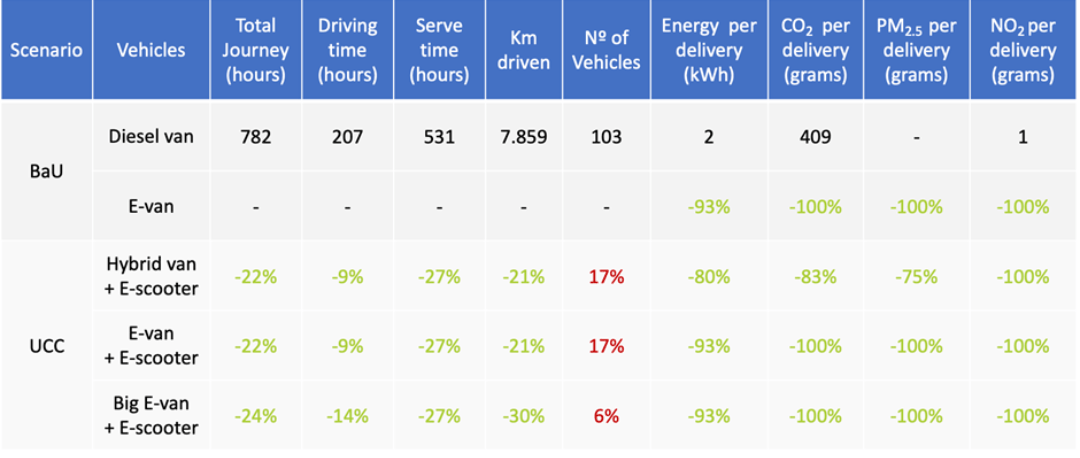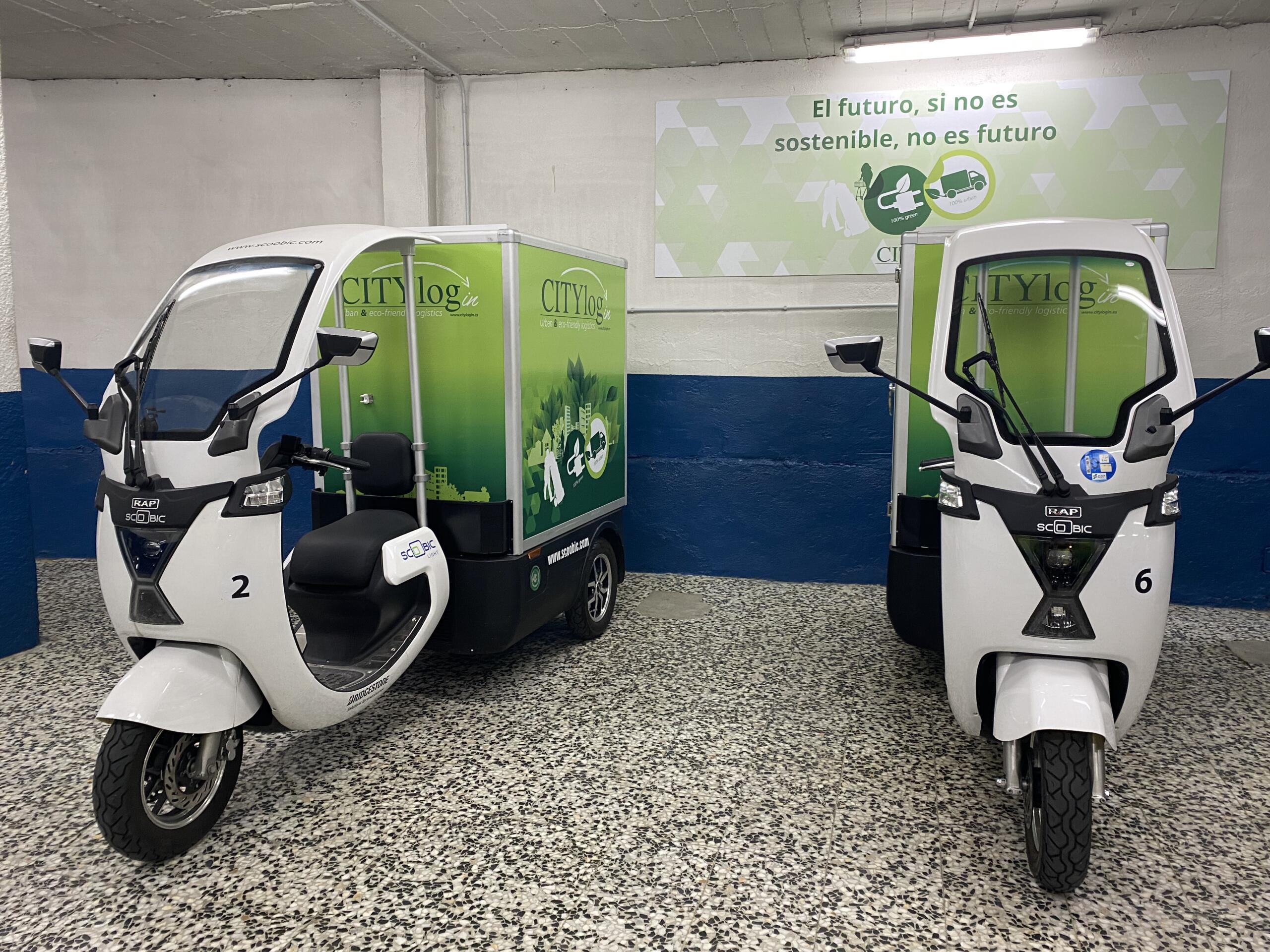Take the LEAD
By using an Urban Consolidation Centre (UCC) to deliver parcels with clean vehicles to the city's heart, Madrid reduced the travelled distance by 30% and greenhouse gas emissions by 80%, demonstrating the better efficiencies attained in using a UCC to deliver goods.
The growth of e-commerce poses a challenge for urban planning, flooding city centres with delivery vans originating from large logistics centres in peri-urban areas. Usually, these vehicles fail to use their full load capacity, to meet customer demands for convenience in delivery location and time.
In Madrid, urban freight accounts for 21% of peak hours air pollution and up to 30% of congestion, requiring action and compliance with policies like the Madrid 360 strategy, and later on, tools like the new SUMP Madrid360.
As a result of the first, Madrid established a Living Lab in the EU-funded LEAD project. The objective was to showcase the efficiencies achieved by using an Urban Consolidation Centre linked to the Trans-European Transport Network delivering goods to the city centre. This avoids the excessive influx of vans and maximises their load capacity, while cross-docking operations ensure that deliveries are carried out using e-vehicles adapted to operate in city centres.
Transforming a parking lot into a UCC
To define Madrid's use case, partners used a business-as-usual scenario where deliveries were made directly from a peri-urban distribution centre — San Fernando — located 25 km away from Madrid’s centre, using diesel-fuelled vans.

Vehicles at the Urban Consolidation Centre in Plaza Mayor. Credit: Citylogin Iberica S.L.
An alternative scenario was proposed, involving consolidated deliveries to an Urban Consolidation Centre from the peri-urban facilities, with the final delivery to customers from the UCC. The first leg of the delivery was made using hybrid vehicles, while 100% electric e-scooters were used for the last mile.
The chosen area for the UCC was Madrid 'Distrito Centro', a Low Emissions Zone (LEZ) set in a 200 sqm facility located in an underground parking lot in Plaza Mayor.
Double trouble: from physical to a digital implementation
EMT Madrid, Madrid Public Transport Company, manages the underground parking lot and entered a public-private partnership with CITYlogin — CITYlogin modified the area, cleaned the facilities, and updated electrical, ventilation, and fire safety installations; additionally, it installed two EV chargers on the exterior wall and provided two towing vehicle spaces and an office for traffic managers.
Using Artificial Intelligence and Data Science, an optimisation engine was employed to create a basic yet efficient Digital Twin (DT) — a technology that was tested over 149 working days for 34,000 deliveries, covering 46,000 kilometres from December 2021 to May 2022 to debug, enhance, and validate the code. The DT predicted a 20% reduction in kilometres driven, as well as congestion, and emissions.

Last-mile delivery vehicle. Credit: Citylogin Iberica S.L.
Based on external feedback, LastMile Team identified three more use cases, and the technology stack was enhanced to run all five use cases in parallel with energy consumption, CO2, PM2.5, and NO2 calculations added to the DT results. The side table summarises the findings, highlighting the bigger electric van as the most efficient option for the first leg of distribution, emphasising the need to optimise both distribution legs and match vehicle dimensions and clearance of underground parking lots for a two-leg distribution system.
Starting in October 2021, the UCC physical operation handles between 1500-2000 daily deliveries using up to 15 clean vehicles (electric/hybrid vans and fully electric three-wheelers) to transport goods within the Low Emission Zone. This has reduced kilometres driven by 30% and driving time by 14%, compared to the previous scenario with goods delivered from San Fernando. This new system created 12 new jobs, including three traffic managers and nine delivery drivers.
Imagine The Sims™, but for last-mile delivery
After the project concludes, EMT Madrid and CITYlogin will determine the type of contract and rent needed to continue the activity. CITYlogin aims to establish a financially stable network of micro hubs to operate from and distribute most of the activity.
Using a Digital Twin can help anticipate business and urban planning decisions at a lower cost by assessing the potential impacts of various distribution models and vehicle types in a given area. Operators can determine which models are economically and environmentally efficient, while planners can evaluate the impacts of such models on the environment, neighbourhood life, and labour relations.
The technology has been successfully demonstrated in an operational environment and can be applied to other business cases. Implementing the solution in a European city with over 200,000 inhabitants and obtaining additional funding for scaling and replication in all EU cities with a population over 50,000 are important steps towards establishing the solution as a leader in sustainable urban goods distribution.

DT Results: Urban consolidation centre vs Business-as-Usual: March 2023. Credit: LEAD project
The future is near, but not quite here (yet)
The technology and models created could become the preferred solution for sustainable urban goods distribution, for cities and private companies. The LEAD platform is available to all stakeholders who wish to test its predictive power for better urban logistics planning allowing it to address last-mile delivery's negative externalities.

Vehicles parked at Madrid's underground UCC. Credit: Citylogin Iberica S.L.
Urban Freight Operations, particularly for e-commerce, pose several challenges. One challenge is the lack of dedicated space for logistics, especially in densely populated areas like Distrito Centro. The current logistics models may also not be suitable for other services like HORECA, requiring adapted solutions.
The quality of solutions heavily depends on the availability and level of detail of data. This poses a challenge for Logistics Service Providers who face low return on investment, coupled with increased delivery costs per expedition.
Further, sharing critical activity data from operators may be a concern, as they may be apprehensive about the protection of their vehicles, drivers, and customer delivery information. Adherence to different industry standards and regulations across different jurisdictions also poses a barrier to adoption and usage, with specific regulatory hurdles to be addressed in different cities before adoption. For policy-making and logistics planning there is a need for local-level technical knowledge and to engage with local stakeholders to successfully define Key Performance Indicators and business models.
About LEAD
LEAD operates under the R&I Actions funding scheme, as facilitated by Horizon 2020 and the Mobility for Growth programme. This project has received funding from the European Union's Horizon 2020 Research and Innovation Programme under Grant Agreement No 861598.

Click here to read the article in its original format.
About the authors:
Cláudia Ribeiro is a Project Manager at POLIS. She has managed several mobility projects and initiatives since 2016. She holds the responsibility of managing multiple EU-funded projects on a diversity of topics, such as urban freight, e-mobility, freight, and sustainable mobility. She has a double master's degree in Political Science from Universitat Pompeu Fabra and the University of Konstanz.
Angel Batalla is the Founder and CEO of LastMile Team. His work and applied research focus on making urban logistics and last-mile distribution sustainable and profitable through human-centred technology. He has led and executed over a dozen major projects across the globe for the consumer, pharmaceutical, and medical sectors.
Alfonso Molina works as a Project Manager for CITYLogin. He is a Category 3 Supply Chain and Logistics certified professional with over 20 years of experience in Operational Areas in Europe’s top logistic companies and over 3 years leading internal projects with multiple stakeholders, implementing change and innovation.
